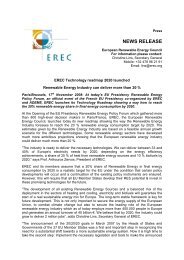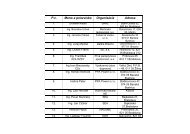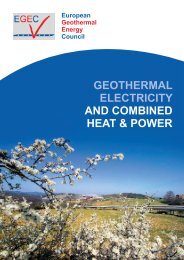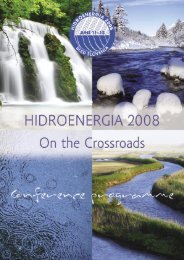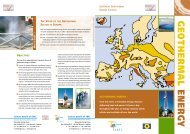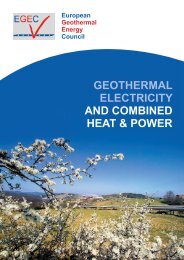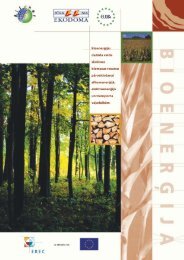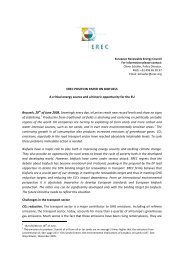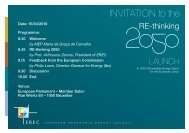C O N F E R E N C E P R O G R A M M ETUESDAY, 20TH JANUARY 2004P A N E L 2 d - H O W T O C R E A T E A L E V E L - P L A Y I N G F I E L D ?18Panel 2d:RENEWABLE ENERGY:HOW TO CREATE A LEVEL-PLAYING FIELD?There is a common understanding that the use of renewableenergy generates benefits in terms of avoiding GHGsemissions, reducing energy imports, creating jobs, however,when discussing the best ways of promoting the marketfor renewables, the question is frequently raised as towhether there is fair competition in the energy market.Fair competition in energy markets is a complex issue,because it needs to take into account a number of differentbut inter-related issues, including the provision ofdirect and indirect public support, and the internalisationof a wide range of external costs.The discussion about internalisation of external costs hasbeen promoted for many years. However, it is both scientificallydifficult to determine the full socio-economic andenvironmental costs of the various forms of energy generationand distribution, and politically difficult to reach agreementon how to integrate such costs into energy prices.In Europe, nevertheless, there is a growing political will foran open debate about the true costs of energy supply andthe integration of the “polluter-pays” principle. Moreover,whilst on one hand, precise national data on the externalcosts created in each country by the use of conventionalenergy sources may be difficult to determine, on the otherhand, it is becoming increasingly clear that most of thoseexternal costs which are created by conventional energysources are not created by renewable energy sources.Such an understanding, even without precise scientificdata, can permit politicians to introduce measures whichbegin to level the playing field for renewable energies, andthis has already been done in some EU Member States,for example the climate change levy in the UnitedKingdom and the carbon tax in Sweden.This session should review how public support for renewablescan be justified in the long term, in order to reflectthe benefits of renewable energy in terms of sustainabledevelopment at global and local levels. It should considerthe relationships between support for renewable energiesand other measures to address carbon emissions, such astaxation, and should include a discussion of the best formsof financing scheme from an industry perspective, sincesuch major long term policies must involve importantcommitments from the private sector.In addition, a number of innovative financing schemes havebeen developed by the private sector in recent years toaddress the growing need for capital investments inrenewable electricity generating plant. The most successfulapproaches should be reviewed in this session, includingthe use of local co-operatives, which have the addedbenefit of stimulating local commitment to the renewablegenerating plants concerned, and third party financingschemes via local <strong>Energy</strong> Services Companies (ESCO’s)and independent developers. Nevertheless, there is still aneed to motivate local Banks and venture capitalists to takea greater interest in the future investment opportunitiesoffered by the renewable energy sector. In relation to thepromotion of export markets, the potential roles of theInternational Financing Institutions, including the EIB andregional investment banks, and for public-private partnershipsshould be discussed.This session should review how public support for renewablescan be justified in the long term, in order to reflectthe benefits of renewable energy in terms of sustainabledevelopment at global and local levels. It should considerthe relationships between support for renewable energiesand other measures to address carbon emissionsand should include a discussion of the best forms offinancing scheme from an industry perspective, sincesuch major long term policies must involve importantcommitments from the private sector.As announced by the German Chancellor Gerhard Schröder atthe World Summit for Sustainable Development in Johannesburgin 2002, the German Government will hold anInternational Conferencefor <strong>Renewable</strong> Energies- <strong>Renewable</strong>s2004 -from 1.-4. June 2004 in Bonn, Germany.The conference will address the lead question: how can wesubstantially increase the proportion of modern renewableenergies in industrialised and developing countries?For more information, contact the Federal Ministry for Economic Cooperationor visit www.renewables2004.de
C O N F E R E N C E P R O G R A M M ETHE CASE OF EEKLOSUPPORT FOR CONVENTIONAL ENERGYIn the small Belgium City of Eeklo a windpower project with an innovative financingscheme is running very successfully. Closecommunity involvement was a main aim of thisproject, which supplies approximately 4 MW tothe Belgian electricity grid. The success of thisproject lies in achieving local support by deliveringdirect benefits to the residents of Eeklothrough selling them shares at 250 Euro each,with 6% annual dividends. All shareholdershave an equal influence on the project regardlessof the amount of shares that they possess.Tentative estimates of subsidies and other kindsof support in the EU in billion of Euros per year806040200Fossil fuels Nuclear <strong>Renewable</strong>sThe main thematic focus will be:Advantages, benefits and potential of renewable energiesStrengthening financing for renewableenergies from all sourcesCreating a more effective governanceand policy environmentBuilding capacity, knowledge and institutionsThe expected outcomes of the conference will include:An international action planwith actions and commitmentsNational and regional targets and timetablesfor renewables, set on a voluntary basisGuidance for good policyA follow-up processand Development, the Federal Ministry for the EnvironmentSource: <strong>European</strong> Parliament - STOA, 2001Traditionally, emerging energy technologieshave always been supported and the value ofpublic support can last for many years, so thateven in countries where the government doesnot provide direct financial support for conventionalenergy sources today, it is frequentlythe case that public support which was madeavailable some years ago is still of benefit intoday’s markets.Many of the investment costs of the olderpower generating plants and distributionnetworks have now been written off in theaccounts of their owners, and therefore suchplants can be more profitable than new ones.Further, many of the traditional energy supplyindustries benefit from indirect publicsupport during their decommissioning phases.What are the best examples of schemesfor internalising the external costs of energyin Europe today?Transparency in energy costs: would thisfavour or discourage <strong>Renewable</strong> <strong>Energy</strong>investments in the long term?What are the long term added values ofrenewable energy compared with conventionalenergy?To what extent is it helpful to link financialinstruments and measures for promotingrenewable energies with those for promotingreductions in greenhouse gas emissions?Should the profits generated by the conventionalenergy industry contribute to thefinancing of renewable energy?How would the internalisation of the externalcosts of energy affect the competitiveness of theleading <strong>European</strong> industries in global markets?Is there a problem today in raising financefor renewable energy projects?Would innovative financing schemes beneeded on a level playing field?19H O W T O C R E A T E A L E V E L - P L A Y I N G F I E L D ? - P A N E L 2 d


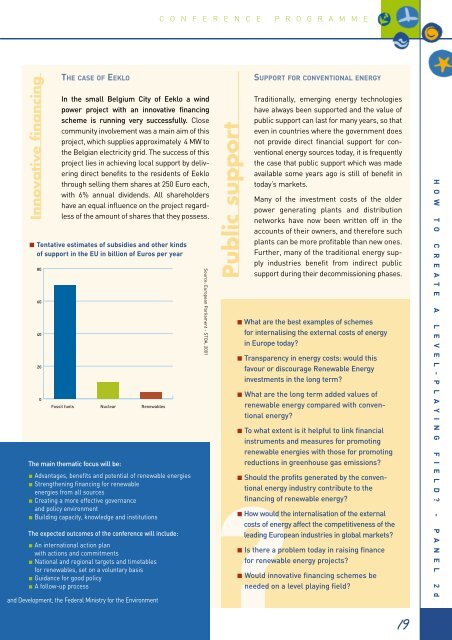

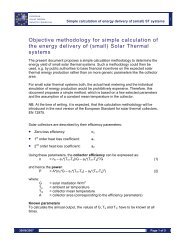

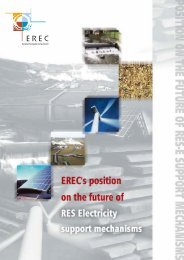
![Energy [R]evolution - Greenpeace](https://img.yumpu.com/47174859/1/184x260/energy-revolution-greenpeace.jpg?quality=85)
